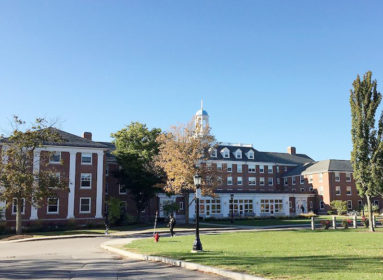Birmingham, May 1963
By Rabbi Jack H Bloom
In May 1963, nineteen members of The Rabbinical Assembly were sent by the Assembly’s convention as its delegation to Birmingham, Ala., during the racial crisis in that city. Rabbi Jack H Bloom, spiritual leader of Congregation Beth Fl, Fairfield, Connecticut, was a member of that delegation. His article, reprinted here, was adapted from a paper he presented to the Conference on the Moral Implications of the Rabbinate, held under the auspices of the Herbert H. Lehman Institute of Ethics in the Fall of 1963.

Jack Bloom chatS with Dr. Martin Luther King at The Klein in Bridgeport, where Bloom had invited the Civil Rights leader to speak.
Why did I go? I am not by nature a hero or a martyr. And it would have been easy not to go, simply by not volunteering. I was frightened. I wasn’t convinced that going was the best course of action. No impelling ethical urge or impassioned oratory moved me. I had no history of standing up for Negro rights. I had never before publicly committed myself that way. I don’t like to stick my neck out. But something within me made it impossible for me not to go.
When other northern clergymen had gone south, I had privately and publicly questioned the wisdom of their act. I remember thinking such thoughts as:
“They don’t understand the southern situation!” They can’t solve the problem! When they return, the local people will be left to pick up the pieces! Is it just a publicity stunt? And what about the situation in the North? What were they doing in their own communities?
On the other hand, I think, I envied the fact that they stood by their convictions on this issue!
One week before the Rabbinical Assembly Convention which sent the delegation, Rabbi Richard Israel of Yale, who had been in an Albany, Ga. jail, asked me if he could add me to the list of people making themselves available in the event that the Southern Christian Leadership Conference needed volunteers for Birmingham. He must have sensed my ambivalence, for he told me that I didn’t have to commit myself on the spot. I could decide when and if I was called.
At the convention, when the critical situation in Birmingham was being discussed, I finally felt that I should put up or shut up. I had often preached that, “There comes a time when a man must take a stand!”
Here was a chance for me to take a clear-cut stand, to get off the fence we all so diplomatically sit on propped up by many “ifs” and “buts.” History was being made. Why shouldn’t I be part of it? There was some ego satisfaction involved in this chance to do something significant. And there was a desire to see what the fuss was all about, to savor the experience as an experience. My studies and my religious training made my going possible, but that was just a part of my motivation. I went for a variety of reasons, and for no one’s sake but my own.
I suspect that most of those who went shared my ambivalence on the racial issue. To a large extent, we had the same background. I was raised in a northern, “lily-white,” Jewish middle class home. I had been taught that all men are brothers, that America is the land of the free. But the only Negroes I knew were the maid who came to our house on Friday, and the men who washed my father’s car. These were real to some extent, the others were abstractions. I could not conceive of the Negro as a brother, certainly not these Negroes. And there was in my life little occasion to test the verbal commitment. Like the environment, I was ambivalent. The Negro was equal, of course, but… Is he ready for equality? And what about the high crime rate? Will the value of my property go down if a Negro moves in? Would you want your daughter to marry a Negro? I shared the image and stereotypes of the Negro common to the liberal white community. I did not experience the Negro as a living brother. At best, he was an abstraction!
At one point in the trip our group’s ambivalence came to the surface. One hour away from the convention we wondered what we were doing anyway. And if Everett Gendler (one of the group’s leaders) couldn’t tell us exactly why we were going, we would really let him have it!
At this point laughter broke the inner tension we all felt. Something had driven us all. Something made us want to act. Everett, of course, couldn’t tell us. The problem was ours. We were ambivalent, and we would have to resolve our feelings in Birmingham. After two days there, we knew why we had come and why we could go again!
The two days in Birmingham were the most significant religious experience of my life. The act of going was to have an effect on my inner ethical and emotional structure almost like that of a conversion. In one area of my life, an ethical position became real. Much that happened to me cannot be communicated, because I cannot verbalize it. Part of what I can verbalize may help to clarify how the change came about. During two days in Birmingham, the Negro became real, his problem became real, and religion generally and Judaism specifically assumed a great contemporary role.
I had been in Birmingham for half an hour when I experienced an infinitesimal part of what it means to be a Negro in America today. As a Jew, it had not happened to me. I was denied entry to hotels and motels. And not because they were full.
Arriving in Birmingham at 5:30 A.M. we were taken to the A.O.Gaston Motel (a Negro motel), where there was room for fifteen men. Four of us would have to go elsewhere! The four of us from Connecticut volunteered, and we were taken by our Negro hosts to a new motel whose parking lot was one-quarter full. Rabbi Harry Zwelling walked in to ask the clerk if he had room for four men. The clerk noted who had brought us and asked if we had reservations. When he told him that we didn’t, he stated that he was filled to capacity. This happened a second time. We then decided that we really needed a night’s sleep. We parked at some distance from another hotel and sent Rabbi Stanley Kessler [then spiritual leader of Beth El Temple in West Hartford] to get rooms for us. He returned saying that all was arranged. Then the clerk ran out of the front door. He had either been called by one of the motels that had turned us down, or somehow had heard that we had been brought by Negroes. “I’m terribly sorry, but I’ve made a mistake. The rooms have been reserved for a late flight that’s coming in a little while. I won’t be able to have you tonight.” He was polite, but we still didn’t have a place to sleep. Our hosts then told us that there was no point looking any further because “Every place in Birmingham knows you’re looking for a place to sleep. You’d do just as well to come back to our motel and we’ll see what we can do.” It was only a sample, but it made quite a difference to me.
I don’t think I’ll ever get over what happened when we entered a Negro church that first sweltering evening. A rally was in progress as the nineteen of us filed in with our kippot on. Everyone stood up for “our rabbis,” applauding, shouting, reaching out to touch us, calling out,
“God bless you,” “Thank you for coming”
and asking for our autographs. There wasn’t a dry eye among us when the packed church improvised a new verse for the freedom song,
It began: “We shall overcome! The Rabbis are with us!”
We spoke to the rally. We heard others speak. We found ourselves
participants in a religious movement, a movement in which our own
experience meant a great deal. We knew what freedom meant; we knew what it was to stand alone; we knew what it meant to be an outsider, to be alienated, and that night this knowledge was real. The fact that the lineal descendants of the people of the Exodus were there meant a great deal. We heard others say that non-violence is the way, that one must understand the man behind the hose.
We heard hope, not anger, we heard that one must witness with the body, when other avenues are closed. Much became real that night.
Religion became a vital force. And especially did the lessons of my own tradition come alive. Responsibility, conquering one’s impulses, loving one’s neighbor, the “Seder” lesson, caring for one’s fellow, all became alive.
Through religion, the tragedy of the American Negro could be translated into an opportunity. And Judaism had something to say to them and to me. My history was theirs, for now they were marching to freedom and somehow they would negotiate a miraculous passage through a sea of hate and indifference, to a new future.
During those days the Negro became real, he became an individual. In part this resulted from the fact that we were living within a Negro community. We met all kinds of people: a bright youngster whose life ambition was to be a secretary because her sense of reality told her that a Negro could hope for nothing higher; a Negro dentist telling us about the problems of voter registration; a college student involved in the demonstrations who remembered seeing a neighbor lynched outside her window; a youngster asking: “Are all Jews rabbis?”
A Negro out of work, living in the most segregated community of the South, telling us that he stayed in Birmingham because it was “home.” Human contacts played a part, but the clincher was that for the first time I was led by Negroes.
They were in charge; they gave the orders and the leadership. These were not maids and car washers who formed my subconscious image of the Negro. They included Martin Luther King, who explained to us that segregation changes an I-Thou relationship into an I-It relationship, and a young graduate of the College of the City of New York, who sensitively and brilliantly explained the situation to us that first morning during minyan as we sat around the table in talis and tephillin, and a young minister, himself not far out of his teens, leading a meeting of teen-agers with a kipah on his head, and a young man from Detroit who in a tense situation patiently explored with us what might be the mast dignified and effective way to demonstrate, and a weekend minister who led a group of his people through a barricade of police fire hoses. These men brought about a change in me. They radically and for all time, altered my image of the Negro. Negroes were no longer an abstraction. They were no longer a sociological problem. They were real!
I really knew that this had happened only after my return to Connecticut. I was watching a baseball game on TV. For the first time, Al Jackson, a Negro pitcher, was a person, not a Negro; a pitcher, not an oddity. I had become a bit more color-blind. I saw a Negro couple walking with their child and they looked different to me than they had before Birmingham I bought some recording tape at a store in Harlem and the clerk was just a clerk to me.
Suddenly missing were my self-pleased condescending tone of voice, the feeling of being so nice to treat a Negro as an equal, the over-solicitousness that often creeps into the behavior of liberal whites when dealing with Negroes.
The act of going to Birmingham changed me. To some extent I empathized with the Negro; my religious commitment was really relevant and the Negro was my brother.
Because I am a rabbi, when I went, my congregation went with me-some willingly, some not willingly, but everyone went. People ask; “What about the North?” I am convinced that the effect at home was as significant as the effect down South. Some of my congregants were proud. Some wished they could have gone. A few volunteered for next time. One said, “Rabbi, you not only pray for our country, you’re doing something about it.” I can’t say that wasn’t nice to hear. Some were glad it was Jews who went. Some thought it was brave. Many hedged. They wondered if it was wise. Would it really help? And. after all, what about the North? But it made many face up to their feelings about Negroes. My going had forced the issue on them. “Rabbi, I like Negroes but…” was a reaction I heard many times in the weeks that followed. Sometimes it had to do with a man who had hired a Negro TV repair man whom no one would allow into their home even though he was an expert repairman. What should his employer do? Sometimes it had to do with housing or intelligence or crime, and once it was our synagogue maintenance man whose children had been beaten up and Negro thugs. The fact of my going had forced the issue on many people. It had to be discussed. The results of the discussions varied, but a problem which could all too easily be ignored in a white suburban community had to be recognized. As one congregant put it when I asked him what effect my trip had on the congregation, “It woke everyone up to the problem.”
As a unit the congregation itself woke up to the problem for the first time. It
asked the head of the local Intergroup Council to speak about the problems that might be coming in our own community. In arranging the program, the chairman told me, “Rabbi, we know where you stand.” Knowing where the rabbi stands makes a difference in a congregation, and a thousand sermons could not communicate what one act did. The teen-agers responded with a typical “What can we do to help?”
In the general community my going made a difference. The battle is in the North as well as in the South, and in any battle an evaluation must be made of who is on which side. By going, I publicly committed myself to one side.
As a result, the forces for open housing, intergroup cooperation, etc. have felt free to count me on that side and to call on me for help. And by implication I have no doubt committed my congregation.
The fact that I went as part of a delegation meant a great deal within and without my congregation.
Many of my congregants felt this was a responsible act because it was sponsored by a national group. These included many who felt that the previous actions had been little more than publicity stunts. A Negro porter approached one of my congregants and told him how glad he was that the Jews had now publicly taken sides in this issue by sending their rabbis down to Birmingham. He was glad that the Jews had done this, for they understood what it meant to be persecuted as a minority.
If my trip had no effect other than that shown in the following incident I think it would have been worth it. One of my congregants is a contractor who employs day labor. He is a devoted, hard-working congregant who in four years has missed one Friday evening service. He has heard me speak about a multitude of topics, including Little Rock, Ark. and Jackson, Miss. About a week after I came back from Birmingham and had spoken about the trip in the synagogue, he came to me and said, “You know, Rabbi, this is kind of hard to admit… his week, as a result of what you did, I employed some Negroes on the job, and you know something, for the first time in my life I didn’t see them as monkeys.”
Like it or not, the rabbi is a symbol of what ought to be important. When he succeeds in resolving his own ambivalence on an issue of crucial importance, the “ought” implicit in his communal existence becomes that much clearer. The act of going to Birmingham was not insignificant. It can be disagreed with, but not discounted. Our people are told that they ought to do many things. One ought to do some thing about civil rights. One ought to live more Jewishly. One ought to realize that the two are the same. The fact that these “oughts” came from a rabbi’s Jewish background was not lost on the congregation. As a result of this experience the “ought” became a little more imperative.
In describing Moses’ role in bringing the Jews out of Egypt, the Reverend Ralph Abernathy, at a rally held in a church, told of Moses’ call to lead his people to freedom. Homiletically he described Moses’ encounter with a bush that could not be consumed, and he told how Moses avoided looking at the bush. God finally forced Moses to look at the bush, and Moses looked at it until the fire of that bush burned within him. With that fire within, Moses took the first steps towards redeeming his people. I think that many of us felt that way about our “Birmingham” experience. Something about those days transformed our brothers’ burning desire for freedom and equality into a flame burning within us.
Rabbi Jack Bloom was the founding rabbi of Congregation Beth El in Fairfield. He is the author of several books, including “The Rabbi as Symbolic Exemplar” and the book of poems, “Blessings For You From Head to Toe”. He lives in Fairfield.








 Southern New England Jewish Ledger
Southern New England Jewish Ledger








